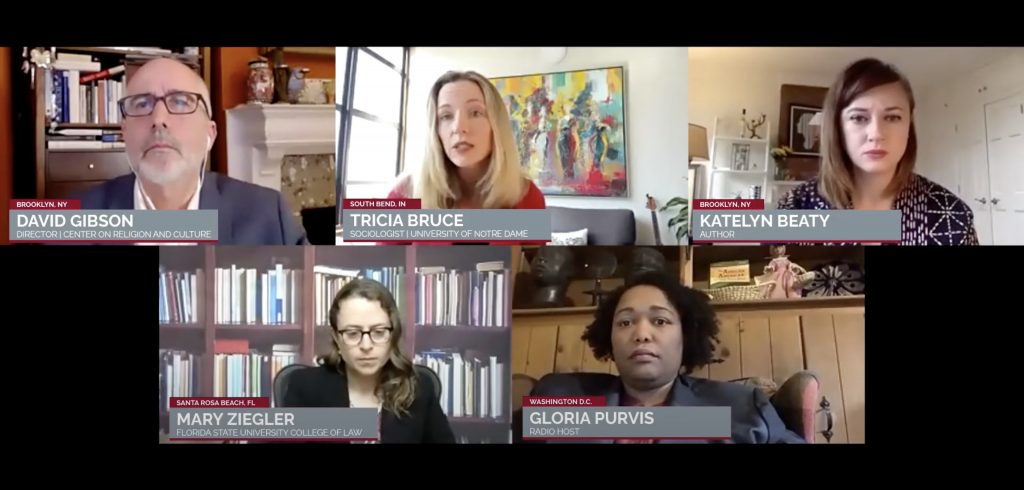The debate over abortion rights must move beyond politics and binary discourse, said panelists at a Jan. 27 Fordham webinar, and shift to include more relevant, everyday struggles of women and their families.
The event, sponsored by the Center on Religion and Culture, featured four women from diverse backgrounds: a researcher who studies American attitudes on abortion, a legal expert on the history of the abortion debate, a Black Catholic radio host and media commentator, and the former managing editor of a major evangelical magazine. In an hour-long conversation, they took a deeper look at the complex issues that surround abortion, from maternal health care to what a good life looks like for a mother and her child.
“As kids, [we]learn to use the tools of boundaries and othering in order to establish our own identities … As a result, we are so stymied by an inability to talk about abortion in a way that starts to unpack some of these other issues, in terms of who is this impacting? How are these choices made?” said panelist Tricia Bruce, a sociologist and an affiliate of the University of Notre Dame’s Center for the Study of Religion and Society. “Instead, we lean on these labels and accusations … and don’t actually recognize the adversity [that women face].”
Opinions on abortion are not as black and white for Americans as some may think, panelists said. Many people don’t want abortion rates to increase, yet they are hesitant to support laws that restrict abortion, said Bruce, who published one of the largest in-depth interview studies on American abortion attitudes this past summer. In other words, abortion isn’t a binary issue.
Gloria Purvis, a Catholic radio host who advocates for Black women and social justice, argued that the discussion should include topics like maternal health care, especially for Black women who have a higher chance of dying during pregnancy than women from other backgrounds. Purvis also emphasized the importance of encouraging women to bond with their babies, rather than shaming and accusing them of milking the U.S. health care system. She also urged those focused on the abortion issue to pay more attention to the everyday issues that women already struggle with.
“To say to someone that’s trying to get a job, who’s trying to get housing, who’s trying to get health care, that you need to be more concerned about abortion … I understand the idea of the dignity of the human person at the center of that, but they have to be able to talk and meet people wherever they are and understand what their immediate needs are that make life itself difficult,” Purvis said.
She also stressed that a man’s role in his child’s life isn’t mentioned enough—“We don’t get pregnant by ourselves,” she said—and that American media doesn’t always set a good example for society.
“Law is a teacher, but it doesn’t change hearts,” Purvis said. “What does our culture teach us in the movies we watch, the stories we tell, the things that are on television?”
Katelyn Beaty, author, journalist, and former managing editor of evangelical magazine Christianity Today, said that she hopes that Christians can eventually see that the pro-life cause is one piece of a larger puzzle.
“Overturning Roe [v. Wade] isn’t going to be the silver bullet that perhaps the pro-life movement has hoped it would be. We have to think beyond Roe, or not hinge everything on Roe, but rather think about issues like health care, educational equity, racial justice and dignity … parental paid leave,” Beaty said. “There are all sorts of other policy goals and priorities that could actually make it more unlikely that women would see abortion as their best or only option.”
It’s unclear how the political shift in the presidential administration might affect American abortion rights, said Mary Ziegler, a professor of law at Florida State University who has extensively studied the legal history of the American abortion debate. The Supreme Court might overturn Roe. v. Wade, but overturning Roe isn’t the equivalent of a nationwide ban, Ziegler said. Instead, the issue would be left to the states.
The panelists agreed that the best way to move forward is to depolarize the sensitive topic with dialogue. Ziegler said that high schools and universities are good places to start having these conversations because these are where people learn how to think and talk about these issues.
“There needs to be some kind of imprimatur by both elite and large public institutions [like Fordham]that it’s OK to have these conversations, and that these conversations matter,” Ziegler said. “This isn’t a cookie-cutter issue … Conversations like this create a space for people to talk about this in ways that feel riskier and are unconventional, but are ultimately more productive.”
“Amen to that,” replied the event moderator, David Gibson, director of Fordham’s Center on Religion and Culture. “That’s very much what we wanted to do with this conversation … really shedding more light than heat on a topic that is just a source of so much passion and controversy.”
The full recording of the event, “Pro-Life. Pro-Choice. Post-Roe? New Prospects for the Abortion Debate in America” is below:


